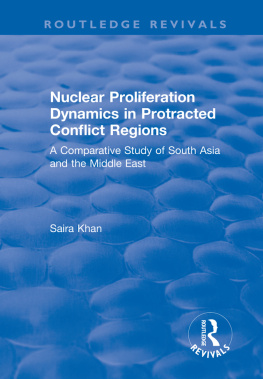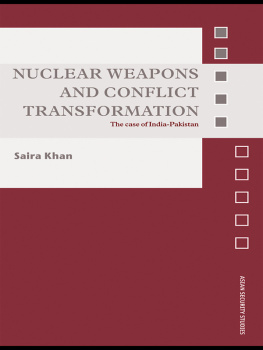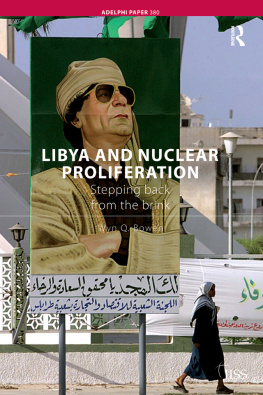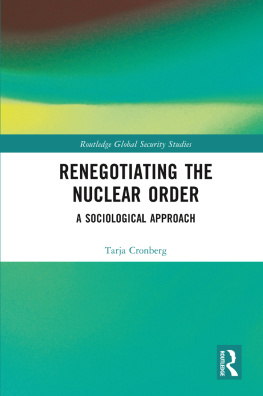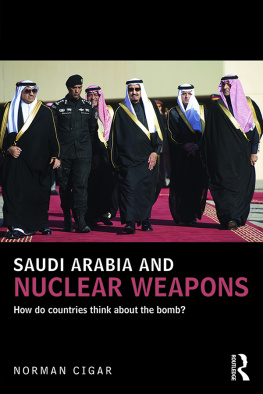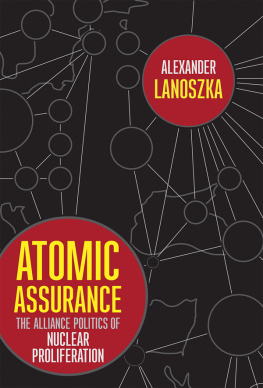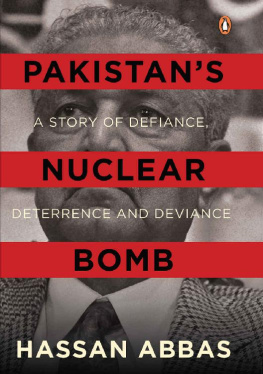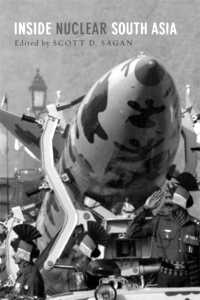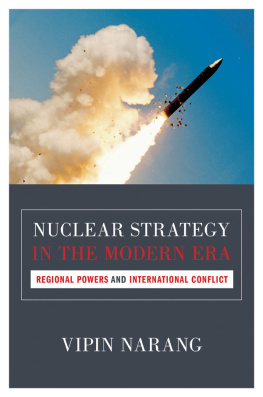NUCLEAR PROLIFERATION DYNAMICS IN PROTRACTED CONFLICT REGIONS
Dedicated to Jalal and Andaleeb
Nuclear Proliferation Dynamics in Protracted Conflict Regions
A comparative study of South Asia and the Middle East
Saira Khan
American University in Cairo
First published 2002 by Ashgate Publishing
Reissued 2018 by Routledge
2 Park Square, Milton Park, Abingdon, Oxon OX14 4RN
711 Third Avenue, New York, NY 10017, USA
Routledge is an imprint of the Taylor & Francis Group, an informa business
Copyright Saira Khan 2002
Saira Khan has asserted her moral right to be identified as the author of this work in accordance with the Copyright, Designs and Patents Act, 1988.
All rights reserved. No part of this book may be reprinted or reproduced or utilised in any form or by any electronic, mechanical, or other means, now known or hereafter invented, including photocopying and recording, or in any information storage or retrieval system, without permission in writing from the publishers.
Notice:
Product or corporate names may be trademarks or registered trademarks, and are used only for identification and explanation without intent to infringe.
Publishers Note
The publisher has gone to great lengths to ensure the quality of this reprint but points out that some imperfections in the original copies may be apparent.
Disclaimer
The publisher has made every effort to trace copyright holders and welcomes correspondence from those they have been unable to contact.
A Library of Congress record exists under LC control number: 2001099223
ISBN 13: 978-1-138-73703-7 (hbk)
ISBN 13: 978-1-138-73702-0 (ebk)
I owe much to the support and encouragement of many people. I start with thanks to T.V. Paul for his unstinting support and key advice since the inception of the book which helped me sharpen my ideas and thoughts. Special thanks to Philip Oxhorn for his ceaseless encouragement and advice at every stage of the project. Thanks also to Mark Brawley whose constructive comments and suggestions have helped me throughout the writing process.
Particular thanks to those individuals who provided insightful comments on the early drafts of the book including Baldev Raj Nayar, Christopher Manfredi, Elisabeth Gidengil, Hudson Meadwell, and Naren Subramanian. In doing research work, I built up debts to many people. I would like to express my gratitude to the following individuals for their vital assistance during my field research work: Akbar Ali Khan, Shafi Sami, Khalilur Rahman, Najam Rafique, K. Subrahmanyam, K.K. Nayyar, Ahmed Abdel Halim, and Ashok Kapur. Special thanks to Michael Brecher for his useful comments and generous assistance in conducting research work. Thanks to Enid Hill for her support and encouragement. Thanks to Meryam Dabhoiwala for her able editorial assistance. I also wish to acknowledge the assistance of Kirstin Howgate and the editorial staff of Ashgate Publishing for bringing this book to press.
The book was made possible through the generous financial support of the McGill University Social Science and Research Grants Sub-Committee and the University of Montreal-McGill Joint Research Group in International Security (REGIS). Special thanks to the American University in Cairo for financial assistance.
On a personal level, I want to pay special tribute to my mother, Nargis Khan, and my late father, Shafiullah Khan, for it is their confidence in my potential that has been instrumental in making this book a reality. I also owe a debt of thanks to my brother, Mahmudul Huq Khan, and sisters, Munira Khan and Zakera Khan, for their constant encouragement.
There are no words to adequately express thanks to my husband, Jalal Ahmed. This book could not have been written without his endless cooperation. My son, Andaleeb Ahmed, has been a constant source of love and joy in my life. From a very young age he understood that family compromises were necessary for the completion of this book. I especially thank him for spending an entire summer at such a young age to assist me with the final stages of production. It is with great pleasure that I dedicate this book to Jalal and Andaleeb.
- ACRS Arms Control and Regional Security
- AEOI Atomic Energy Organization of Iran
- ATM Anti-Tank Missile
- BARC Bhabha Atomic Research Center
- BJP Bharatiya Janata Party
- CBMs Confidence-Building Measures
- CBW Chemical and Biological Weapons
- CIA Central Intelligence Agency
- CMT Crisis Management Technique
- CTBT Comprehensive Test Ban Treaty
- CWC Chemical Weapons Convention
- DRDO Defense Research and Development Organization
- IAEA International Atomic Energy Agency
- INC Iraqi National Congress
- IR International Relations
- J&K Jammu and Kashmir
- LAC Line of Actual Control
- MRBM Medium-Range Ballistic Missile
- MTCR Missile Technology Control Regime
- NATO North Atlantic Treaty Organization
- NPT Nuclear Non-Proliferation Treaty
- NRR Normal Relations Range
- NWFZ Nuclear Weapons-Free Zone
- PAEC Pakistan Atomic Energy Commission
- PC Protracted Conflict
- PLO Palestinian Liberation Organization
- PPP Peoples Party of Pakistan
- PRC Peoples Republic of China
- R&D Research and Development
- SAMs Surface-to-Air Missiles
- SNEP Subterranean Nuclear Explosion Project
- SSMs Surface-to-Surface Missiles
- UN United Nations
- UNAEC United Nations Atomic Energy Commission
- UNSCOM United Nations Special Commission
- US United States
- USSR Union of Soviet Socialist Republics
- WMDs Weapons of Mass Destruction
With the end of the Cold War nuclear proliferation has emerged as a significant international security relations problem. Although control of the spread of nuclear weapons has been an aspect of the international agenda since 1946, the Cold War rivalry prevented much serious attention being paid to it. After the end of the Cold War and again at the conclusion of the 1990-91 Gulf War, when Iraq's secret nuclear weapons program was discovered, nuclear non-proliferation became the number one priority of the leading western nations. Within the first five years of the post-Cold War era, the Nuclear Non-Proliferation Treaty (NPT) was extended indefinitely. It was followed by the conclusion of the Comprehensive Test Ban Treaty (CTBT) which has been signed by a majority of states. India, Pakistan, and Israelthree key regional stateshave remained non-signatories of the NPT, while the first two have yet to sign the CTBT.
The conclusion of the CTBT has been a remarkable achievement in the history of arms control. The treaty is unique not because 152 countries have signed it, but because, unlike the NPT, which was opposed by two nuclear powers initially, all declared nuclear powersthe USA, Russia, Britain, France and Chinahave committed themselves to abide by the CTBT. Although ratification of the treaty still remains to be done, the most important western concern appears to be that India and Pakistan, two of the 44 nations with nuclear power or research reactors, have refrained from being part of the treaty. Ratification of the treaty by these two countries along with the remaining 42 countries is essential for it to come into force. Western policy for the last few years has thus been to pressure these two major South Asian states to sign the CTBT. While this has remained the West's principal occupation, India and Pakistan have continued their own clandestine nuclear weapons development. Twenty-four years after its first nuclear tests, India, in May 1998, conducted five underground nuclear tests. Within two weeks, Pakistan, for the first time, performed six nuclear tests. These nuclear tests have not only alarmed the world, but they have also returned the subject of nuclear proliferation to international attention.

